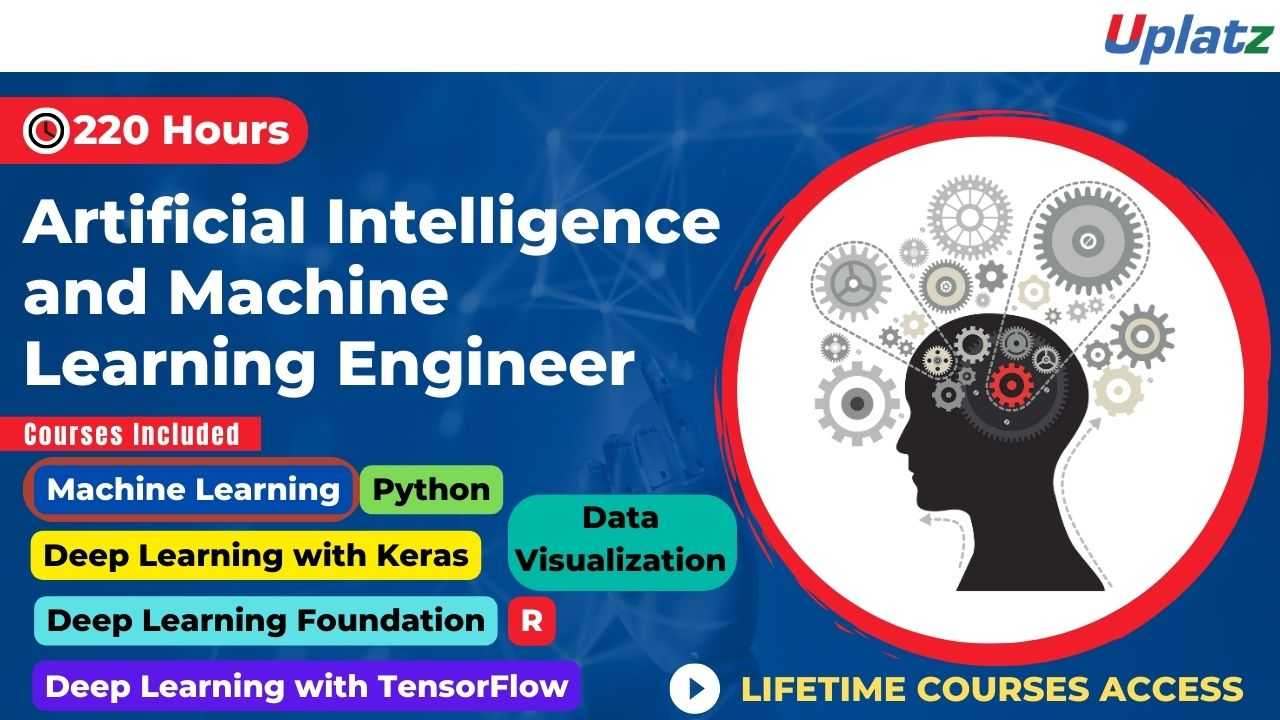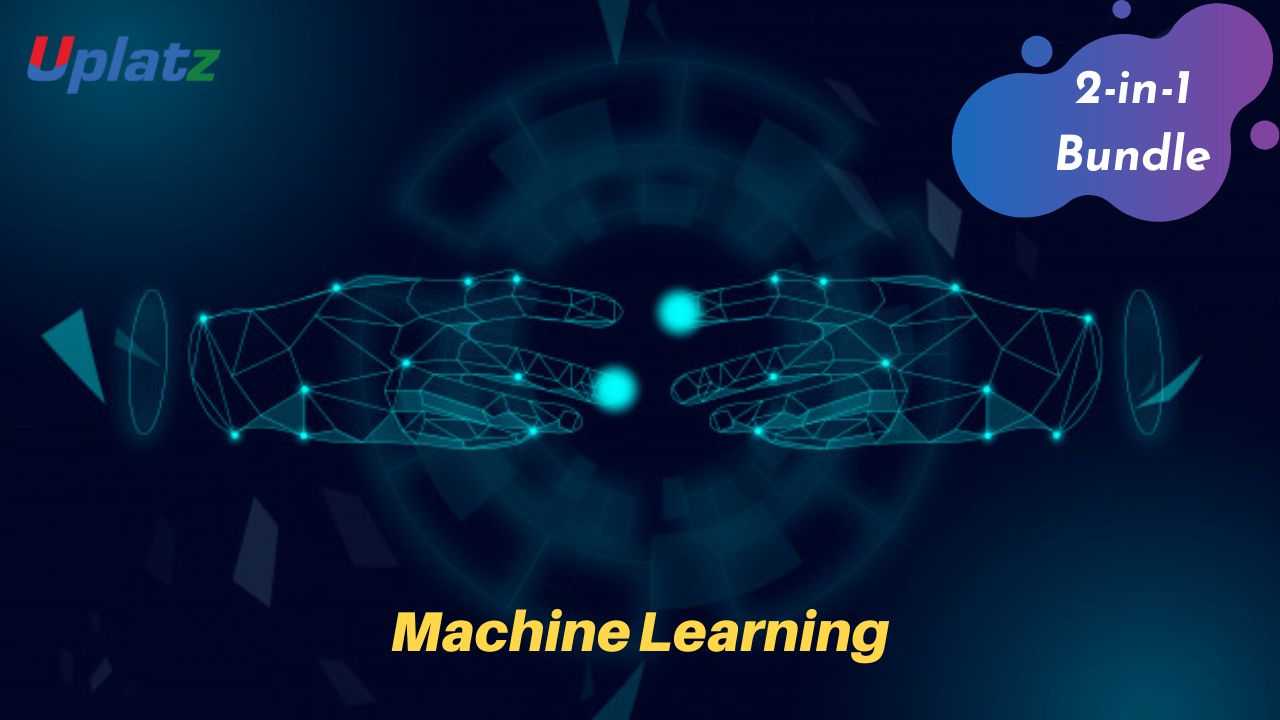Interview Questions - Machine Learning
Get familiar with the commonly asked interview questions on Machine Learning and Artificial Intelligence. Get hired as a top Machine Learning EngineerPreview Interview Questions - Machine Learning course
Price Match Guarantee Full Lifetime Access Access on any Device Technical Support Secure Checkout Course Completion Certificate 92% Started a new career
BUY THIS COURSE (
92% Started a new career
BUY THIS COURSE (GBP 12 GBP 29 )-
 93% Got a pay increase and promotion
93% Got a pay increase and promotion
Students also bought -
-

- Machine Learning (basic to advanced)
- 65 Hours
- GBP 12
- 4543 Learners
-

- Career Path - Artificial Intelligence & Machine Learning Engineer
- 220 Hours
- GBP 32
- 5212 Learners
-

- Bundle Multi (2-in-1) - Machine Learning
- 100 Hours
- GBP 22
- 1986 Learners

Machine Learning is the fastest-growing branch of artificial intelligence, in which computers can learn from data, statistics, and trial and error to improve processes and innovate more quickly. Machine learning allows computers to gain human-like learning skills, allowing them to address some of the world's most difficult challenges, such as cancer research and climate change. It allows a system to learn without being explicitly coded by allowing it to learn from examples and experience. As a result, rather than writing code, you input data to a generic algorithm, and the algorithm/machine develops the logic based on the data.
Machine learning is the science of allowing computers to work without being programmed. Machine learning is a branch of computer science which deals with system programming in order to automatically learn and improve with experience. Machine Learning is being utilized as a part of numerous businesses. With more companies using machine learning as a critical pillar for innovation and success, there is a lot of opportunity for knowledgeable and motivated Machine Learning engineers. It is one of the sectors with excellent career possibilities, both in terms of remuneration and in terms of the diversity of tasks accessible.
This course by Uplatz will take you through some of the Interview Questions on Machine Learning that you’re likely to encounter on your way to achieving your dream job. In this course, you’ll learn exactly what to expect during a machine learning interview. You’ll cover all the questions and technical strategies, and review a range of important topics, from machine learning calculations to image classification. You’ll also learn best practices for data structure questions and whiteboard problems, and at the end of the course, you’ll get unlimited access to interviews on Pramp. Complete this course and tune your interview skills today!
This course consists of some of the most frequently asked Interview Questions - Machine Learning that goal to help you revise all the necessary concepts and skills to land your dream job. This Uplatz course is specifically designed for you to do a thorough Interview Questions - Machine Learning preparation before going for the interview.
With this ML Interview Questions course, many students got placed in reputed companies with high package salary. This training on the most often asked questions in Machine Learning Engineer / Data Scientist job interviews is provided by Uplatz. You will study and get familiar with the accurate and complete answers to the most commonly asked Machine Learning interview questions in our Machine Learning interview questions course.
Course/Topic - Interview Questions - Machine Learning - all lectures
-
In this Machine Learning Interview Questions tutorial, you will get to know about the different questions being asked by the interviewers in an interview and their answers regarding Machine learning like what do you understand by machine learning, differentiate between inductive and deductive learning.
-
In this Machine Learning Interview Questions tutorial, you will get to know about the different questions being asked by the interviewers in an interview and their answers regarding Machine learning like how do classification and regression differ, what is meant by overfitting in machine learning.
-
In this Machine Learning Interview Questions tutorial, you will get to know about the different questions being asked by the interviewers in an interview and their answers regarding Machine learning like how machine learning differs from deep learning, how is KNN different from K-means.
-
In this Machine Learning Interview Questions tutorial, you will get to know about the different questions being asked by the interviewers in an interview and their answers regarding Machine learning like what are the different types of algorithm methods in machine learning.
-
In this Machine Learning Interview Questions tutorial, you will get to know about the different questions being asked by the interviewers in an interview and their answers regarding Machine learning like what are the 5 popular algorithms used in machine learning.
-
In this Machine Learning Interview Questions tutorial, you will get to know about the different questions being asked by the interviewers in an interview and their answers regarding Machine learning like what is model selection in machine learning, what are the 3 stages of building the hypotheses or model in machine learning.
-
In this Machine Learning Interview Questions tutorial, you will get to know about the different questions being asked by the interviewers in an interview and their answers regarding Machine learning like what are the common ways to handle missing data in a dataset, what do you understand by ILP.
-
In this Machine Learning Interview Questions tutorial, you will get to know about the different questions being asked by the interviewers in an interview and their answers regarding Machine learning like how you explain a linked list and an array.
-
In this Machine Learning Interview Questions tutorial, you will get to know about the different questions being asked by the interviewers in an interview and their answers regarding Machine learning like what is bagging and boosting, what are the similarities between bagging and boosting.
-
In this Machine Learning Interview Questions tutorial, you will get to know about the different questions being asked by the interviewers in an interview and their answers regarding Machine learning like what do you understand by cluster sampling, what do you know about Bayesian networks.
-
In this Machine Learning Interview Questions tutorial, you will get to know about the different questions being asked by the interviewers in an interview and their answers regarding Machine learning like what do you understand by the F1 score, how is a decision tree pruned.
• Machine Learning interview questions and answers
• How to ace Machine Learning job interviews
• How to improve your Machine Learning expertise
• How to become a Machine Learning Engineer
• Learn about the most popular Machine Learning subjects
• This course will guide you to brush up on the skills of machine learning to crack the interview
• Here, our focus will be on real-world scenario ML interview questions asked in Microsoft, Amazon, etc., and how to answer them
• This course can help you learn the key concepts required to build your machine learning career
The Machine Learning Certification ensures you know planning, production and measurement techniques needed to stand out from the competition.
Machine learning is a subfield of artificial intelligence, which is broadly defined as the capability of a machine to imitate intelligent human behavior. Artificial intelligence systems are used to perform complex tasks in a way that is similar to how humans solve problems.
Machine learning is the concept that a computer program can learn and adapt to new data without human intervention. Machine learning is a field of artificial intelligence (AI) that keeps a computer's built-in algorithms current regardless of changes in the worldwide economy.
This Professional Certificate from IBM is intended for anyone interested in developing skills and experience to pursue a career in Machine Learning and leverage the main types of Machine Learning: Unsupervised Learning, Supervised Learning, Deep Learning, and Reinforcement Learning.
Uplatz online training guarantees the participants to successfully go through the Machine Learning Certification provided by Uplatz. Uplatz provides appropriate teaching and expertise training to equip the participants for implementing the learnt concepts in an organization.
Course Completion Certificate will be awarded by Uplatz upon successful completion of the Machine Learning online course.
The Machine Learning draws an average salary of $114,000 per year depending on their knowledge and hands-on experience.
Yes, machine learning is a great career path if you're interested in data, automation, and algorithms as your day will be filled with analyzing large amounts of data and implementing and automating it.
Employment website Indeed.com has listed machine learning engineer as #1 among The Best Jobs in the U.S., citing a 344% rate of growth and a median salary of $146,085 per year. Overall, computer and information technology jobs are booming, with employment projected to grow 11% from 2019 to 2029.
Note that salaries are generally higher at large companies rather than small ones. Your salary will also differ based on the market you work in.
AI and Machine Learning.
Machine Learning Scientist.
Jr Machine Learning Engineer.
AI - Deep Learning/Computer Vision.
1. Why was Machine Learning Introduced?
The simplest answer is to make our lives easier. In the early days of “intelligent” applications, many systems used hardcoded rules of “if” and “else” decisions to process data or adjust the user input. Think of a spam filter whose job is to move the appropriate incoming email messages to a spam folder.
But with the machine learning algorithms, we are given ample information for the data to learn and identify the patterns from the data.
Unlike the normal problems we don’t need to write the new rules for each problem in machine learning, we just need to use the same workflow but with a different dataset.
Let’s talk about Alan Turing, in his 1950 paper, “Computing Machinery and Intelligence”, Alan asked, “Can machines think?”
The paper describes the “Imitation Game”, which includes three participants -
· Human acting as a judge,
· Another human, and
· A computer is an attempt to convince the judge that it is human.
The judge asks the other two participants to talk. While they respond the judge needs to decide which response came from the computer. If the judge could not tell the difference the computer won the game.
The test continues today as an annual competition in artificial intelligence. The aim is simple enough: convince the judge that they are chatting to a human instead of a computer chatbot program.
2. What are Different Types of Machine Learning algorithms?
There are various types of machine learning algorithms. Here is the list of them in a broad category based on:
· Whether they are trained with human supervision (Supervised, unsupervised, reinforcement learning)
· The criteria in the below diagram are not exclusive, we can combine them any way we like.
3. What is Supervised Learning?
Supervised learning is a machine learning algorithm of inferring a function from labeled training data. The training data consists of a set of training examples.
Example: 01
Knowing the height and weight identifying the gender of the person. Below are the popular supervised learning algorithms.
· Support Vector Machines
· Regression
· Naive Bayes
· Decision Trees
· K-nearest Neighbour Algorithm and Neural Networks.
Example: 02
If you build a T-shirt classifier, the labels will be “this is an S, this is an M and this is L”, based on showing the classifier examples of S, M, and L.
4. What is Unsupervised Learning?
Unsupervised learning is also a type of machine learning algorithm used to find patterns on the set of data given. In this, we don’t have any dependent variable or label to predict. Unsupervised Learning Algorithms:
· Clustering,
· Anomaly Detection,
· Neural Networks and Latent Variable Models.
Example:
In the same example, a T-shirt clustering will categorize as “collar style and V neck style”, “crew neck style” and “sleeve types”.
5. What is ‘Naive’ in a Naive Bayes?
The Naive Bayes method is a supervised learning algorithm, it is naive since it makes assumptions by applying Bayes’ theorem that all attributes are independent of each other.
Bayes’ theorem states the following relationship, given class variable y and dependent vector x1 through xn:
P(yi | x1,..., xn) =P(yi)P(x1,..., xn | yi)(P(x1,..., xn)
Using the naive conditional independence assumption that each xiis independent: for all I this relationship is simplified to:
P(xi | yi, x1, ..., xi-1, xi+1, ...., xn) = P(xi | yi)
Since, P(x1,..., xn) is a constant given the input, we can use the following classification rule:
P(yi | x1, ..., xn) = P(y) ni=1P(xi | yi)P(x1,...,xn) and we can also use Maximum A Posteriori (MAP) estimation to estimate P(yi)and P(yi | xi) the former is then the relative frequency of class yin the training set.
P(yi | x1,..., xn) P(yi) ni=1P(xi | yi)
y = arg max P(yi)ni=1P(xi | yi)
The different naive Bayes classifiers mainly differ by the assumptions they make regarding the distribution of P(yi | xi): can be Bernoulli, binomial, Gaussian, and so on.
6. What is PCA? When do you use it?
Principal component analysis (PCA) is most commonly used for dimension reduction.
In this case, PCA measures the variation in each variable (or column in the table). If there is little variation, it throws the variable out, as illustrated in the figure below:
Principal component analysis (PCA)
Thus making the dataset easier to visualize. PCA is used in finance, neuroscience, and pharmacology.
It is very useful as a preprocessing step, especially when there are linear correlations between features.
7. Explain SVM Algorithm in Detail
A Support Vector Machine (SVM) is a very powerful and versatile supervised machine learning model, capable of performing linear or non-linear classification, regression, and even outlier detection.
Suppose we have given some data points that each belong to one of two classes, and the goal is to separate two classes based on a set of examples.
In SVM, a data point is viewed as a p-dimensional vector (a list of p numbers), and we wanted to know whether we can separate such points with a (p-1)-dimensional hyperplane. This is called a linear classifier.
There are many hyperplanes that classify the data. To choose the best hyperplane that represents the largest separation or margin between the two classes.
If such a hyperplane exists, it is known as a maximum-margin hyperplane and the linear classifier it defines is known as a maximum margin classifier. The best hyperplane that divides the data in H3
We have data (x1, y1), ..., (xn, yn), and different features (xii, ..., xip), and yiis either 1 or -1.
The equation of the hyperplane H3 is the set of points satisfying:
w. x-b = 0
Where w is the normal vector of the hyperplane. The parameter b||w||determines the offset of the hyperplane from the original along the normal vector w
So for each i, either xiis in the hyperplane of 1 or -1. Basically, xisatisfies:
w . xi - b = 1 or w. xi - b = -1
Support Vector Machine (SVM)
8. What are Support Vectors in SVM?
A Support Vector Machine (SVM) is an algorithm that tries to fit a line (or plane or hyperplane) between the different classes that maximizes the distance from the line to the points of the classes.
9. What are Different Kernels in SVM?
There are six types of kernels in SVM:
· Linear kernel - used when data is linearly separable.
· Polynomial kernel - When you have discrete data that has no natural notion of smoothness.
· Radial basis kernel - Create a decision boundary able to do a much better job of separating two classes than the linear kernel.
· Sigmoid kernel - used as an activation function for neural networks.
10. What is Cross-Validation?
Cross-validation is a method of splitting all your data into three parts: training, testing, and validation data. Data is split into k subsets, and the model has trained on k-1of those datasets.
The last subset is held for testing. This is done for each of the subsets. This is k-fold cross-validation. Finally, the scores from all the k-folds are averaged to produce the final score.









